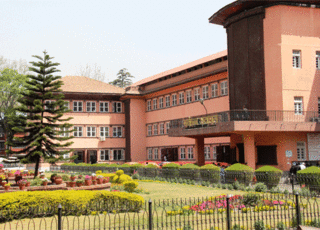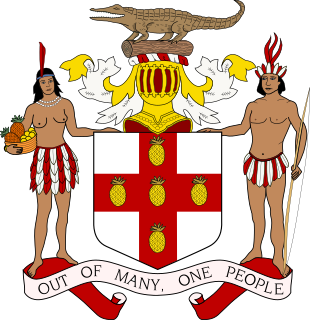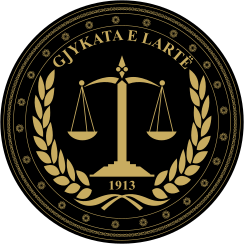
The federal government of the United States is the national government of the United States, a federal republic in North America, composed of 50 states, a federal district, five major self-governing territories and several island possessions. The federal government is composed of three distinct branches: legislative, executive, and judicial, whose powers are vested by the U.S. Constitution in the Congress, the president and the federal courts, respectively. The powers and duties of these branches are further defined by acts of Congress, including the creation of executive departments and courts inferior to the Supreme Court.

The Judicial Yuan is the judicial branch of the government of the Republic of China on Taiwan. It runs a Constitutional Court and oversees all systems of courts in Taiwan, including ordinary courts like the supreme court, high courts, district courts as well as special courts like administrative courts and disciplinary courts. By Taiwanese law, the Judicial Yuan holds the following powers:
The Supreme Court of Ireland is the highest judicial authority in Ireland. It is a court of final appeal and exercises, in conjunction with the Court of Appeal and the High Court, judicial review over Acts of the Oireachtas. The Supreme Court also has appellate jurisdiction to ensure compliance with the Constitution of Ireland by governmental bodies and private citizens. It sits in the Four Courts in Dublin.

The Supreme Court of Nepal is the highest court in Nepal. It has appellate jurisdiction over decisions of the seven High Courts and extraordinary original jurisdiction. The court consists of twenty Justices and one Chief Justice.

The Supreme Court of the Netherlands, officially the High Council of the Netherlands, is the final court of appeal in civil, criminal and tax cases in the Netherlands, including Curaçao, Sint Maarten and Aruba. The Court was established on 1 October 1838 and is located in The Hague.

The Supreme Court of Sri Lanka is the highest court in Sri Lanka and the final judicial instance of record. Established in 1801 and empowered to exercise its powers subject to the provisions of the Constitution of Sri Lanka, the Supreme Court has ultimate appellate jurisdiction in constitutional matters and takes precedence over all lower courts. The Sri Lankan judicial system is a complex blend of common law and civil law. In some cases, such as those involving capital punishment, the decision may be passed on to the President of Sri Lanka for clemency petitions. The current Chief Justice of Sri Lanka is Jayantha Jayasuriya.

The Court of Appeal of Singapore is the nation's highest court and court of final appeal. It is the upper division of the Supreme Court of Singapore, the lower being the High Court. The Court of Appeal consists of the chief justice, who is the president of the Court, and the Judges of Appeal. The chief justice may ask judges of the High Court to sit as members of the Court of Appeal to hear particular cases. The seat of the Court of Appeal is the Supreme Court Building.

A supreme court is the highest court within the hierarchy of courts in many legal jurisdictions. Other descriptions for such courts include court of last resort, apex court, and highcourt of appeal. Broadly speaking, the decisions of a supreme court are not subject to further review by any other court. Supreme courts typically function primarily as appellate courts, hearing appeals from decisions of lower trial courts, or from intermediate-level appellate courts.

The Supreme Court is the highest court in the Kingdom of Spain. Originally established pursuant to Title V of the Constitution of 1812 and currently regulated by Title VI of the Constitution of 1978, it has original jurisdiction over cases against high-ranking officials of the Kingdom and over cases regarding illegalization of political parties. It also has ultimate appellate jurisdiction over all cases. The Court has the power of judicial review, except for the judicial revision on constitutional matters, reserved to the Constitutional Court.

The judiciary of Jamaica is based on the judiciary of the United Kingdom. The courts are organized at four levels, with additional provision for appeal to the Judicial Committee of the Privy Council in London. The Court of Appeal is the highest appellate court. The Supreme Court has unlimited jurisdiction in all cases, and sits as the Circuit Court to try criminal cases. The Parish Court in each parish hears both criminal and civil cases, excluding grave offences. The Petty Sessions are held under Justices of the Peace, with power to hear minor crimes.
The Constitutional Court of Mongolia is the highest court in Mongolia responsible for the interpretation of the constitution. Thus, the Constitutional Court has supreme power over the implementation of the Mongolian Constitution. The Court delivers decisions on violations of constitutional procedures and resolves constitutional disputes. All governmental action is subject to the Court.

The Judiciary of Brazil is the group of public entities designated by the Brazilian constitution to carry out the country's judicial functions. It consists of five entities: the Supreme Federal Court (STF); the Superior Court of Justice (STJ); federal regional courts; military courts; and the courts of states, the federal district, and territories. The STF and the superior courts - the Superior Labor Court (TST), the Superior Electoral Court (TSE), and the Superior Military Court (STM) - are based in Brasilia, Brazil's capital, and have jurisdiction throughout Brazil. Eleven justices sit on the Supreme Federal Court, whose primary function is to uphold the constitution. The STJ consists of at least 33 justices.

The Supreme Court of the Republic of Albania is the highest court of Albania and is the final court of appeals in the country's judicial system. It is composed of seventeen judges: the Chief Justice and sixteen Members.

The Supreme Court of Nauru is the highest court in the judicial system of the Republic of Nauru.

The Supreme Court of Mauritius is the highest court of Mauritius and is the final court of appeal in the Mauritian judicial system. It was established in its current form in 1850, replacing the Cour d'Appel established in 1808 during the French administration and has a permanent seat in Port Louis. There is a right of appeal from the Supreme Court of Mauritius directly to the Judicial Committee of the Privy Council in London. On 30 July 2020, a new building was inaugurated jointly by Indian Prime Minister Narendra Modi and Mauritian Prime Minister Pravind Jugnauth.
The Judiciary of Kosovo is the collection of the central Kosovo institutions that exercises judicial authority in Kosovo. According to the 2008 Constitution of Kosovo, the judicial system is composed of the Supreme Court and subordinate courts, a Constitutional Court, and an independent prosecutorial institution. The courts are administered by the Kosovo Judicial Council.

The Supreme Court of the Dominican Republic is the highest court existing in the Republic and is, therefore, the head of the judiciary in the country.
The Judiciary of Azerbaijan exercises judicial power separately from the legislative power of parliament and executive power of the president.

The Supreme Court of the Gambia is a superior court of record and the highest court in The Gambia. Established in 1851, it has appellate and original jurisdiction over any law exceeding the powers conferred by the Constitution or any law upon the National Assembly or any other person or authority.
Supreme Court of Azerbaijan is the highest court instance and final court of appeal of three-staged judicial system in Azerbaijan. Established in pursuant Article 131 of the Constitution of the Republic of Azerbaijan and Article 77 of the Law "on Courts and Judges". Supreme Court has competence to carry out justice on civil, criminal disputes and other cases related to the execution of general or specialized courts. Despite being established in Baku, its jurisdiction apply to entire territory of the Republic of Azerbaijan.

















